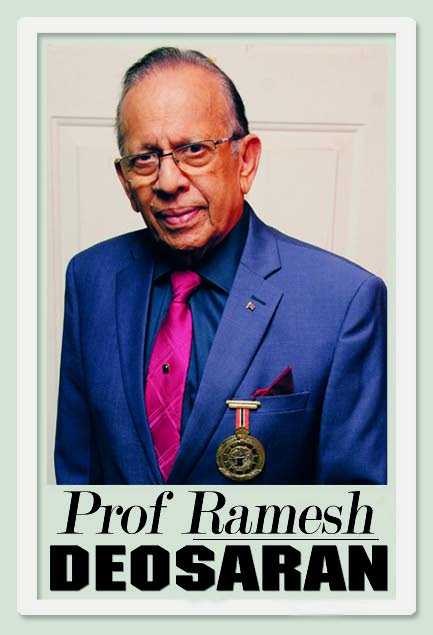The 'ugly ego' in politics

As the country looks on at Tobago’s unsettling political struggles, I remember an old story of power going as far back as Satan’s rebellion against God.
Satan, it is said, could no longer stand being No 2. Maybe, for revenge, it was Satan who injected the “ugly ego” into humanity, a kind of original sin, the guiltless craving for power.
It is commonly said that power ambitions are better served by being big fish in small pond than remaining little fish in big ponds. Power over others, and the fascinating struggles over it, have always been intriguing.
So it is today with the struggle between Progressive Democratic Patriots (PDP) political leader and former Tobago House of Assembly (THA) deputy chief secretary Watson Duke and Chief Secretary Farley Augustine.
Augustine’s report last Thursday alleging widespread corruption by the previous regime certainly adds political drama.
Resigning as deputy chief, Duke complained: “I and the PDP rank and file have been continuously disrespected and ignored by the Chief Secretary.”
Accusing Augustine of “corruption,” Duke told Augustine: “You are no lone wolf, no boss, simply a hiring through the party.” Duke fired three party deputies, including Augustine.
And so, while the glory from the party’s 14-one victory over the PNM in the 2021 THA elections was soured, a power struggle between a voluntary political party and the legally framed THA exploded, with numerous analysts trying to explain how and why.
Many said it was an expected “clash of personalities.” Another declared “a clash of egos.”
Gladstone Cuffie wrote: “A flare-up by Watson Duke was predictable as the morning sun.”
Lecturer Dr Indira Rampersad said in an interview: “Duke has a strong personality and would not have been happy playing second fiddle to Augustine.”
She intuitively added: “There should be mediation to work out a solution as ‘two bo rats’ can’t live in one hole.” Egos don’t allow that.
Comparing the public profiles of Duke and Augustine, some commentators referred to “ego” and its “disruptive” implications.

Letter-writer Arnold Gopeesingh stated: “The ego and the ‘do it my way or else’ attitude must be something of the past.”
Don’t hold your breath. The theatre of politics is nothing without the ego of politicians in varying degrees. Power struggles and egocentric politicians within this country’s political parties are nothing new and will continue. Our adversarial political system inevitably invites ego conflict, one relentlessly against the other, each resisting the first blink.
But what really is “ego?” Widely referred to in Parliament, political platforms and the media, why is it so cursed, so despised?
First of all, “ego” is a psychological concept, originally invented to capture a person’s individuality, but it eventually became a code, especially in politics, for oversized ambitions, exaggerated self-importance, ballooning self-confidence and even bullying. Hence the term “egomaniac.”
However, the “ego,” especially in politics, has therefore got more of a bad name than it really deserves. Basically, it is the psychological energy that pushes us to achieve, to ride over obstacles, to take entrepreneurial risks, etc. Without the ego, lives and living would be flattened into pure dullness. Sigmund Freud, giving stellar recognition to the ego concept, saw it as the manager between basic instincts and human ideals.
In politics, however, excessive egotism is seen as dangerously subversive which obliges us to see if any politicians around fit the bill.
However, two things here: Firstly, political egos can exist in different degrees of force and quality – from very mild to restlessly overbearing. It’s like any vehicle’s engine – four-cylinder, six-cylinder, eight-cylinder – and the degree of power so derived.
Depending on childhood or later experiences, the socialised ego can become twisted, bruised, vengeful or noble and benevolent in its manifestations. Not all egos are therefore that “ugly.” Generally, very mild egos in politics produce team workers. Overbearing, egocentric ones push others aside, craving for exclusive admiration and supremacy – an enduring challenge for democratic parties.
Secondly, the egocentric political maverick uses any means to achieve his ends, losing the moral compass. With selfishness and arrogance, his ego becomes ugly in practice – unable to turn back. He becomes a self-serving, vengeful narcissist and even a danger to the party and constitution. Quite hot-tempered, he tolerates no dissent. He grows into a control freak, claiming to know everything, despising advice.
In other words, given that politics has a morality of its own, the narcissist-type egotist (with an exaggerated opinion of himself) finds enough populist space to practise his deceptive art.
And curiously, many people in an economically troubled, frustrated, disordered society begin to like it so. Having abandoned their civic responsibilities, they hunger for a political messiah, a hero, to do it for them, ignoring the dangers in the long run.
Freud recognised the animalistic origins of the ego and created the “super-ego” as an instrument of moral oversight – the good conscience. The egocentric politician of whom we now speak suspends conscience and becomes amoral (not concerned with morality) and a danger to democracy.
That is why the resolution of the political struggle in Tobago should be a learning experience.

Comments
"The ‘ugly ego’ in politics"